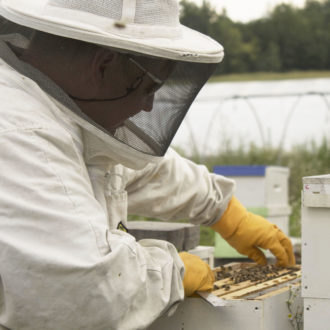Pollinators are essential parts of the ecosystem and are crucial to the success of growers everywhere. There has been an increasing decline in pollinator populations, especially native bees, in the last 20 years with four species seeing a 96% decrease and three others going into extinction, according to the Sierra Club. A few key factors contribute to this phenomenon including the loss of high quality nutritional native vegetation and habitats, and pests such as the Varroa mite. The loss of native bee species is especially problematic as researchers in a 2011 study at Cornell found that they are two to three times more plentiful pollinators than honeybees.
Northeast SARE grantee John Hayden of The Farm Between in Vermont hopes to increase wild bee populations through creating strategies for managing Colletes bees in orchards, a type of ground nesting native species (FNE17-871). These pollinators are ideal as Hayden writes, "They are some of the first to emerge in the spring and are well adapted to adverse conditions." The goal of the project is to create suitable ground nesting conditions for the bees and to collect pupae from existing aggregations in the fall to be buried in newly created conditions for the next season.
The prevalence of the parasitic Varroa mites in honey bee colonies are a considerable threat in the region. Grantee Jeffrey Berta of Always Summer Herbs, LLC in Pennsylvania built upon the work of Dr. Greg Hunt’s research on the phenomenon of mite-biting behavior (MBB) when honeybees bite off the leg from a mite and subsequently cause the mites to bleed to death. Berta’s project (FNE16-836) aimed to find correlations between the rate of chewing and factors such as the time of year, temperatures, overall colony size and health, and more. Berta writes, "The most notable outcome is that people are now aware that bees can defend themselves against the Varroa mite parasite by chewing. Now people are looking to see if their bees are exhibiting this behavior; they have become 'backyard scientists'."
Hayden’s project is ongoing and is set to be completed at the end of this year. Berta continues to build upon the Varroa mite research with additional grant-funded studies regarding mite-biting behavior.
These studies and more than 100 other grant projects regarding pollinators and their health may be found at projects.sare.org.
